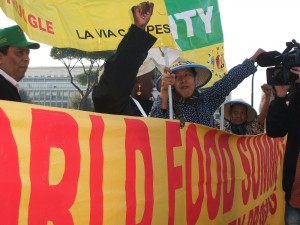Agence France Presse | Tuesday, 17 November 2009
By Anne-Sophie Legge of AFP
Multinational food companies have come under fire for buying up farmland in developing countries by activists holding a forum in parallel to the UN Hunger Summit.
"It's our land, let's fight for it," a group of African and South American activists wielding shovels and rakes shouted across from the headquarters of the UN Food and Agriculture Organisation, host to the three-day summit on food security.
"We reject (US agri-chemical giant) Monsanto and the new technologies of the multinationals," said Henry Saragih, general coordinator of La Via Campesina, an international advocacy group for small farmers.
"With their palm oil, they feed cars, not people," he said. "Around 80 per cent of the people who are hungry in the world live in rural areas. But the FAO's policy supports multinationals, who monopolise the land of small farmers in Asia, Africa and Latin America."
Saragih is among more than 400 delegates from around 70 countries attending the "People's Food Sovereignty Now" forum held parallel to the UN Hunger Summit.
Renee Vellve, a researcher for the agricultural rights group GRAIN, said the summit had broached the issue of "land grabs" without proposing viable solutions.
"The heads of state say they want to find a solution that benefits both the small farmers and the multinationals, but it's illusory," she said.
Food corporations are geared to "mass production for export, (which) systematically hurts local production," said Vellve, a researcher on the issue in the Philippines.
Lalgi Desai Rabari, a herder in western India, stressed the effectiveness of expertise passed down through the generations. "This local knowledge gives us good yields, without GMOs (genetically modified organisms)," he said.
Also attending the forum is an umbrella group representing indigenous peoples, wishing "to sound the alarm on the dire effects suffered by their communities from the food crisis".
The FAO summit, which runs through Wednesday, has already produced a final declaration roundly criticised by small farmers as well as aid, humanitarian and environmental groups.
"The heads of state and international organisations show no willingness to challenge the existing agro-industrial model," said Andrea Ferrante, president of the Italian organic agriculture association.
"As a result, they promote the actions of multinationals who are chasing small farmers from their land," he said.
La Via Campesina earlier blasted the "arrogance" of food corporations for "pretending to provide solutions for the food crisis".
It said in a statement: "Many transnational companies ... have played a major role in increasing hunger in the world by taking control over the food system and the productive resources such as land and water, excluding family farmers from food production."
Saragih singled out the Swiss food giant Nestle, which he said "directly contributes to the impoverishment of (Indonesian) farmers and malnutrition, particularly among babies, through their control of production and pricing in the dairy sector".
The anti-poverty group ActionAid criticised the lack of financial specifics in the Hunger Summit declaration, saying in a statement: "There is still no clarification on the financial framework for a global partnership."
It added: "G8 leaders ... have still failed to specify how and when the money will be channelled and how the UN will be supported to fulfil its mandate to fight hunger."
CIDSE, an umbrella grouping of Catholic charities, said for its part that the summit "failed to produce a concrete agenda for moving away from business as usual, even as the number of hungry in the world continues to rise".













